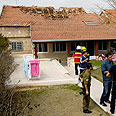
State denies Sderot petition for tax exemption
Sderot residents petition court to exempt them from taxes, claiming Israel failed to protect them from Qassam threat. State representative says security situation in Sderot does not justify exemption
The State petitioned the Tel Aviv District Court on Wednesday, asking it denies a petition put forth by 40 Sderot residents who asked for tax exemptions. In response, the State cited that "it is unclear to what lengths the State must go in order to appease the plaintiffs."
Judge Avi Zamir held a hearing on the State's request to deny the petition, wherein a representative of the State said that the security situation in Sderot does not justify tax exemptions, and in any case the District Court cannot determine whether Sderot's security situation differs from that of Tel Aviv. "We believe that the courts are not capable of deliberating the circumstances of this case," the representative stated.
Among the residents who filed the petition were Alon Davidi, Batia Katar and Rina Mor-Yosef. They requested exemption from state taxes, claiming "these are only taxes we need to pay the State Treasury, such as VAT, income tax, etc. We would continue to pay taxes to the city municipality, which provides us with services."
The residents claim Israel has repeatedly refused to protect them from Qassam rockets and has abandoned them to Palestinian terrorism, and therefore until the court can prove that the State provides them with the same security cities in other parts of Israel benefit from, especially the metropolitan area of Tel Aviv, they should be exempt from all state taxes.
The petition further called for the reimbursement for all taxes paid since June 28 2004 - the day in which the first Qassam casualty was reported.
According to the petition, from that day on the State knew for a fact that Qassam rockets are a threat to the lives of Sderot's residents, yet it did nothing to prevent them.
The right to life
The plaintiffs were represented by attorney Nitsana Darshan-Leitner of the Israel Law Center. Darshan-Leitner stated that the case "is based on the social treaty that links the citizens' duty to pay taxes with the State's duty to defend their lives." The only reason civilians agree to the burden of taxes, she added, is so that their security needs would be taken care of, the most important of which is defense of their lives.
"It is illegal and immoral for the State to neglect the residents of Sderot for any reason, political or otherwise," Darshan-Leitner continued. "The State and its citizens have a contract. The citizens agree to pay the State money in exchange for defense of their topmost right – the right to life. When the State does not uphold its end of the contract and violates it regarding the residents of Sderot and the residents of the Gaza vicinity communities, these residents are exempt from upholding their end of the contract, namely paying taxes."
Since the beginning of 2007 and until the end of 2008, Sderot's residents pay 50% of the regular property tax. In addition, they are eligible for other benefits cited by Chirman of the Knesset's Finance Committee Stas Misezhnikov (Yisrael Beiteinu).
The law makes the government compensate Sderot for the loss of property tax, and this week the Knesset Finance Committee approved a special funding to the amount of NIS 38 million ($11.23 million) in compensation for the city council.
Finance Ministry: Committee to helping residents
Finance Ministry Director-General Yarom Ariav rejected the residents' claims Wednesday, saying "we are deeply committed to helping the residents of Sderot, who face a security burden much heavier than can be compensated financially."
On Monday, the Knesset's Finance Committee approved, upon Finance Minister Ronnie Bar-On's request, a series of regulations enabling speedy compensation payments to business owners in Sderot and the Gaza vicinity communities for indirect damages caused by the rocket fire.
Ariav said he fully understands the residents' claims and admitted that the benefits approved by the Ministry could not compensate for the suffering endured by the Negev residents. But, he added, the Treasury had other considerations and constraints to think of.
"All in all, in the financial aspect, we try to do the maximum out of a commitment to stand by the residents and ease their pain, "he concluded.
Zvi Lavi contributed to the report










